Our mania to look healthy is actually making us sick, warns surgeon Nikki Stamp

Dr Stamp says rising gym memberships, increased sales in diet books don't reflect reality. Photo: Getty
“Social media darlings” are putting lives at risk by promoting so-called superfoods and wellness advice on Instagram, according to a scathing assessment from Australian heart surgeon Nikki Stamp.
Dr Stamp has also taken aim at the flourishing gym industry, the explosion in activewear and the number of fitness apps and devices on offer – and she’s not impressed.
“They are not health. They are not even close to being indicators of what health is,” she said.
“We look at the number of people joining gyms, wearing sneakers or even buying diet books and say, ‘We have to be getting healthier’.
Except of course, these statistics are all an illusion.

Is our obsession with the perfect image a help or hindrance? Photo: @desnorteeu, Unsplash
Dr Stamp is a cardiothoracic surgeon and has written a new book, Pretty Unhealthy, which argues our pursuit of looking healthy is actually making us sick.
Her inspiration was a text she received from her GP one day that warned she had high blood pressure.
“My first thought was, ‘Well, I’m not unhealthy. I’m wearing a size small’,” she said.
“Which is such a ridiculous thing to say, and especially for someone who should know better.
“It was at that moment that I went, ‘Oh, this is where we’re going wrong. How can we possibly be healthy when all we’re trying to be is beautiful?'”
People ‘shunning’ cancer treatment
Social media is awash with influencers promoting a healthy lifestyle and diet, with many being paid to endorse particular foods and products that promise a certain look.
The hashtag #fitspo – fitness inspiration – has been used more than 67 million times on Instagram alone, and much has been written about the effect social media can have on body image.
More broadly, the wellness industry is now worth an estimated $6 trillion worldwide.

There’s no shortage of #cleaneating advice online. Photo: Alkira Reinfrank, ABC News
Dr Stamp draws on her own clinical experience and discussions with patients, and said problems arose when people associated looks with health.
Instagram is such a thing around this issue, isn’t it? It is actually not great for us to be motivated by appearance concerns,” she said.
“It does tend to lead to health behaviours which actually aren’t healthy.
“So things like dangerous dieting, disordered eating, not exercising, or conversely overexercising. And then there’s obviously the mental health implications: anxiety, depression, poor body image.”
Dr Stamp said a particularly problematic area was the promotion of certain foods believed to have specific health benefits.
“Coconut oil, for example, was touted as a panacea just a few years ago, yet research has called its benefits into question; in some cases it can be detrimental to health,” she writes.
“Yet it’s still promoted by social media darlings as the secret to health or dietary success.
“In some cases, popular bloggers have risked lives by stating that they can cure cancer, leading to growing numbers of people completely shunning conventional, proven treatment.”
‘We need to be more cynical’
Celebrities are among the most influential online advertisers, with the likes of the Kardashians and Kylie Jenner endorsing products like “detox” drinks and hunger-suppressing lollipops.
Earlier this year the medical director of England’s National Health Service urged social media companies to ban “irresponsible and unsafe” adverts.
There has also been a counter-movement by celebrities like actor Jameela Jamil who promote body positivity and are critical of people using fame to sell products or an ideal look.
Tweet from @jameelajamil
Dr Stamp said some wellness advocates could be leading people down the garden path, and ultimately we should put our faith in trusted sources.
“We all need to be a little bit more cynical with what we read and how much faith we put in that,” she said.
“And this isn’t just online or in the media — I think we need to be mindful about what we share amongst our friends and family, how we talk about our bodies, how we talk about food, for example.
“There is a lot of work to be done in that space about everyone maybe doing a little bit better.”
– ABC








